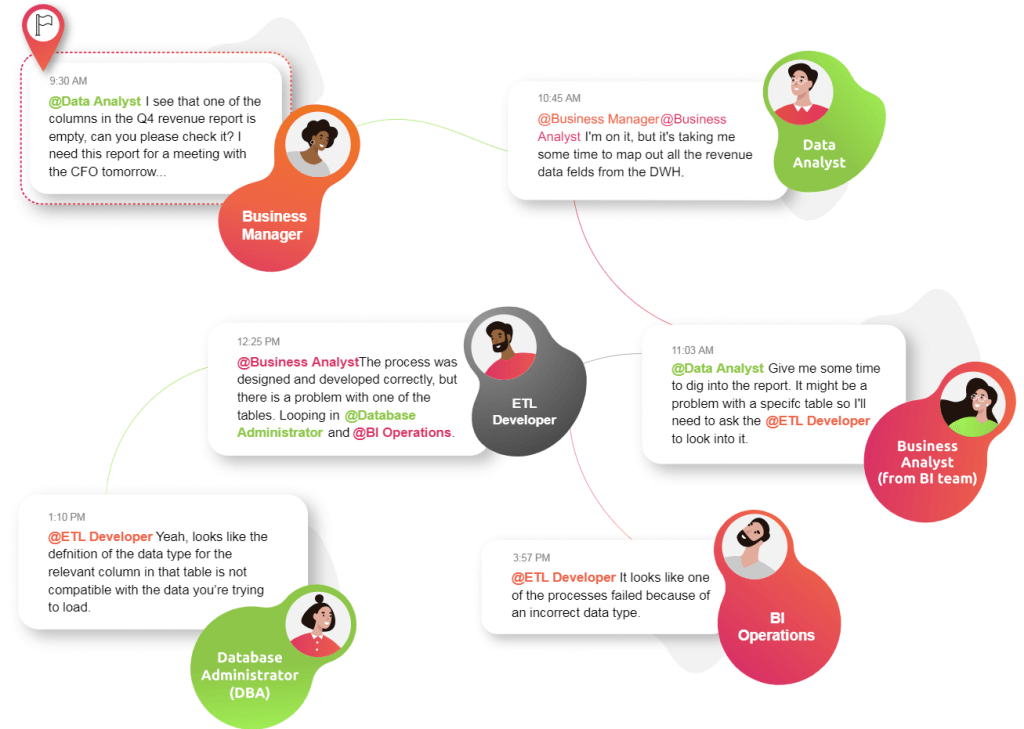As you may have experienced, one of the many impacts of the COVID-19 pandemic is that on-premises metadata management may no longer be a feasible way to connect BI teams. Without this essential link, information may be lost, misplaced, or deleted altogether.
So, how can BI teams still develop insights and guide their companies in the right direction? Further, although key stakeholders may be physically away from the workplace, they still need to access metadata information to produce reports.
BI teams have found the perfect solution: they are migrating their metadata management to the cloud.
On-Prem Metadata Management Slows Down BI Teams
Picture the typical day in the office of a large-scale company. BI teams are busy sifting through data when a Business Manager discovers an error in a revenue report. They need this issue resolved as soon as possible. As shown in the infographic below, the entire business intelligence and data team are pinged to try and figure out the discrepancy.

The Business Manager sends it to a Data Analyst, who then loops in a Business Analyst. The Business Analyst adds even more people to the process until six team members are involved. In this case, each person requires a bit more information in order to solve the problem. This pertinent information is separated by both team hierarchy and on-premises metadata systems.
Now imagine how complex this process becomes when everyone is working separately, be it a few miles or across the country. On-premise metadata management is, by its very nature, a less efficient and slower process.
By moving metadata resources to the cloud, BI analysts are no longer separated from the tools that they need in order to provide insights and time-sensitive answers.
3 Key Benefits for BI Teams Moving Their Metadata Management to the Cloud
1. Cross-Platform Metadata Centralization
The most crucial reason that BI teams have embraced the cloud is perhaps the simplest. Cloud-based metadata management enables teams to access the company’s metadata from anywhere, which is of particular importance right now since entire departments are working from home for the foreseeable future :(. Having metadata in one place and accessible by all team members provides some essential benefits:
- Efficient error reporting and resolution is achieved.
- Everyone is on the same page by working with the same datasets.
- This leads to more productive collaborations.
With a cloud-based metadata platform, teams can continue their work no matter what outside challenges arise.
The Many Faces of Metadata Management
From BI Operations, to Data Governance and Data Catalogs - read our white paper on how to maximize metadata management in your enterprise.
Download our White Paper
2. Intuitive Metadata Management
Another significant advantage of cloud metadata management is its intuitive nature. On-premise BI tools are complex, with high installation and maintenance costs. Keeping them in working order requires hiring specialists as well as specialized personnel who can properly extract the necessary information.
In contrast, information is easy to upload to the cloud, where it becomes available to anyone who needs it the minute it goes live. In addition, cloud-based metadata tools democratize access to the information within.
Think back to our infographic, which shows the process of error diagnosis jumping from analyst to analyst. The other problem at play here is a lack of data literacy. With a more intuitive interface, powered by the cloud, data literacy is increased and this empowers smaller teams to solve bigger problems.
3. Improved Teamwork and Collaboration
Since the cloud allows information to be uploaded immediately, all team members have access to the same data, at the same time. This facilitates a quicker response time for BI teams to create accurate insights because they are utilizing the most up-to-date information. Once a team member saves something to the cloud, it is updated immediately. BI teams will never suffer a setback from data falling between the cracks as it transfers from server to server. This is due to the cloud’s interface and automatic nature.
Additionally, with BI reporting tools in place, data can be easily analyzed and team members will understand if any information has been removed or damaged. Instead of mistakenly incorporating poor quality data, BI teams can trust the information contained in the cloud since each change or edit is recorded.
Cloud Solutions for Business Intelligence
Finding improved ways for teams to perform BI metadata management isn’t just about maximizing productivity during the current crisis. It’s about figuring out which metadata management tools will prepare teams for the future of data analysis. Cloud-based metadata processing is crucial to that future, and the sooner your team is ready to use that new platform, the better off it will be.






